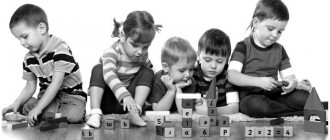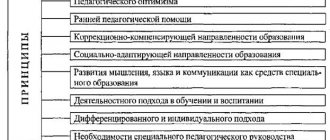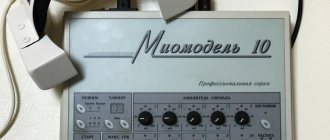Psychospeech development delay (PSRD) is a group of disorders that are united by clinical symptoms of delayed development of speech and psyche. These include expressive and receptive speech disorders, unspecified diagnoses, as well as mixed specific disorders in the field of human psychological development (specific disorders of speech development, school skills, motor functions without a predominance of one of the symptoms to be able to make an accurate diagnosis).
They are usually associated with atypical functioning of the central nervous system, which ultimately leads to changes in the pace of all mental development and affects the following components:
- memory;
- attention;
- thinking;
- speech;
- emotional-volitional sphere;
- behavior.
Delayed psycho-speech development is not synonymous with a child’s mental retardation. The key difference is that mental retardation can be corrected and compensated for, while mental retardation cannot be corrected. Difficulties may arise if you do not contact a specialist in a timely manner, because... speech problems and cognitive deficits are steadily increasing.
ZPRD syndrome is determined by a doctor (psychiatrist, neurologist) based on the symptoms present. After determining the type of psycho-speech delay, an individual correction plan is developed, as well as a possible referral to a specialized kindergarten, school or development group (if we are talking about a combined institution).
What is FGR in children? Treatment of cervical cancer in Russia, Saratov
SRD is a delay in speech development in children , a delay in speech development. SRD is characterized by a lag in speech development from the age norm.
Sarklinik provides treatment for cerebral cancer in Russia , treatment for cerebral cancer in Saratov .
New methods of treating mental retardation activate the speech centers of the brain, improve speech development, improve diction, increase vocabulary (the number of words used), and improve the acquisition of new speech skills. The doctor will tell you what the diagnosis of mental retardation , how treatment is carried out, diagnosis, correction of mental retardation , what to do, how to treat mental retardation at any age (at 2 years old, at 3 years old, at 4 years old, at 5 years old, at 6 years old, at 7 years and older), how to cure mental retardation, whether classes with children are needed if the child has a delay in speech development , why speech delay , speech disorders , as well as how to restore and improve speech development, what is general speech underdevelopment (GSD) , alalia, alexia (dyslexia), aphasia.
If your baby is different from others, be sure to visit a doctor. An experienced specialist will see developmental abnormalities in the child, prescribe an examination and provide the necessary therapy.
Why does it occur
The very name socio-pedagogical disorder explains the etiology and indicates the factors contributing to the occurrence of pathology. Causes of delay in speech development:
- adults ignoring the baby, the child has no one to talk to;
- hyperprotection, in which you don’t need to ask for anything, everything will be given;
- unhealthy atmosphere within the family, constant conflicts between parents;
- Mom and dad communicate in different languages.
In families where the baby’s only interlocutor is the TV, vocabulary is limited to phrases from cartoons. Excessive lisp also provokes a negative reaction. The baby's use of gestures and facial expressions to obtain the necessary information can alert parents. He attracts attention to himself with various sound signals, and can tug on adults’ clothes to stimulate attention.
Delayed psycho-speech development, psycho-speech development, mental retardation in children
Delayed psycho-speech development in children , delayed psycho-speech development , mental retardation are increasingly common in children in recent years. At the first appointment, the doctor will tell you how to identify a child with mental retardation, how to diagnose mental retardation, what is the diagnosis of mental retardation in children, what forms, types, classification, definition of mental retardation, developmental features of children with mental retardation, personality traits of the child, how correction is carried out, psychocorrection, correctional work, treatment of mental retardation, treatment of delayed psycho-speech development in Saratov , are classes needed, osteopath, methods, program, training of children ( children with mental retardation ), which includes general characteristics, examination of children, development of children with mental retardation, examination of children, diagnostics ( including neurosonography), differential diagnosis, psychodiagnostics, is disability registered, what kind of prevention is there, what are the behavioral characteristics of children with mental retardation, how to cure mental retardation of cerebral-organic origin? How to teach children with developmental delays, is mental retardation treated ? Preschoolers (kindergarteners, kindergarten, kindergarten, preschool age, preschool children, preschoolers, schoolchildren), primary schoolchildren (school, gymnasium, lyceum) are currently constantly exposed to great stress, emotional, and mental stress. Increased load can sometimes have a negative impact on the child’s central nervous system, the emotional sphere, sensory development, social development suffer, mental retardation is observed, thinking, cognitive sphere, memory development suffers, and mental development lags. More often, mental retardation of cerebral organic origin is observed; there is also retardation of somatic origin, tempo delay of psychological, psychoemotional, mental, emotional, physical, statomotor, motor development, stages of development, including constitutional, statokinetic origin.
Diagnosis of mental retardation and methods of correction
To diagnose mental retardation in a child, it is necessary to consult several specialists who can confirm or refute this condition. This is a speech therapist, defectologist, psychologist, neurologist, pediatrician, and also a psychiatrist.
To diagnose CPR, the following is necessary:
- Detailed history taking.
- Carrying out CT, MRI, as well as an encephalogram, the results of which may indicate the presence of physiological reasons for the possible development of mental retardation.
- Conducting a psychological and pedagogical examination, during which the child’s ability to think and play activities is established. A diagnosis of memory, attention, as well as the emotional-volitional sphere of the child is carried out.
- Detailed examination of speech features.
If, as a result of studies, diagnostics, and consultations, this condition is confirmed, the baby needs corrective measures. Treatment is complex and requires the involvement of a whole group of different specialists. In the learning process, an emphasis on repetition, frequent changes of activities, and visualization of educational materials is important.
What is important to pay special attention to in the process of correctional work:
- An increase in the number of cognitive processes.
- The emotional sphere of the child, which is normalized as a result of active activities in a playful way.
- Normalization of speech activity, which is possible during regular speech therapy classes.
What is PVD in children? Treatment of ZPRR in Saratov, Russia
ZPRD is a delay in psycho-speech development in children ( delayed psycho-speech development ). With ZPRD, both mental development delay and speech development delay are observed. Sarklinik provides treatment for cervical cancer in Russia , treatment for cervical cancer in Saratov . Diagnosis, correction, overcoming, complex treatment of mental retardation and developmental rates activate both the mental and speech development of the child. ZNPRR is a delay in neuropsychic-speech development, or a delay in neuropsychic development.
At the first consultation, the doctor will tell you what the diagnosis of SPR in children is, autism, what are the signs of SPR, symptoms of SPR, how treatment for SPR is carried out in Saratov, Moscow, St. Petersburg, China, in Russia, how to cure SPR with autistic traits , in including ZPRR on a residual organic background .
Psychology of adolescents, problems of age from 12 to 18 years
Dissatisfaction with one's own appearance, anorexia, bulimia
Adolescence brings with it many new, often painful, experiences. So, a teenager, especially a girl, may begin to dislike her own appearance: she seems too fat, or her nose is not the right shape, or she (him) has an unpleasant smell. Ideas of excessive obesity entail limiting oneself in food, up to exhaustion (anorexia nervosa). Subsequently, girls with anorexia begin to periodically eat huge amounts of food, and then artificially induce vomiting (the stage of bulimia and vomiting behavior). Anorexia is life-threatening! Do not delay contacting a psychiatrist!
Depression, depression, social withdrawal
It is during adolescence that mood disorders, most often depression, first appear. Unreasonable prolonged melancholy, thoughts about one’s own failure, unwillingness to live, decreased general activity, sleep and appetite disturbances are a reason to sound the alarm! Adolescents, unfortunately, represent a group at increased risk of suicide.
Leaving home, wandering
Sometimes teenagers develop an attraction to changing places and wandering. Some of them run away from home, may go to another city, or simply ride public transport all day long. They can spend the night in basements, in the subway, and steal for food. Take such a traveler to a psychiatrist.
Adolescent behavioral problems: conflict, rejection of authority, bad company, early sexual intercourse, sexual deviations
Everyone knows how intractable and difficult previously flexible children become with the onset of adolescence. This should make you happy: the desire to separate from parents, group with peers, imitate idols, oppose one’s own opinion, and stubbornness are normal manifestations of growing up. It is the absence of such changes that should be alarming. But if there is a problem with behavior, the teenager skips school, communicates with asocial companies, is insolent and uncontrollable to such an extent that it seems that he is deliberately mocking and “harassing” his parents, shows signs of perversion of impulses (sadistic manifestations, sexual perversions), - this indicates that that the puberty crisis is pathological and this is a reason to seek help.
Fears for your health, including mental health
And finally, the teenager may have concerns about his health. Cancer, AIDS - all the most terrible diseases can be “discovered” by teenagers, usually against the background of an anxious and depressive mood. Sometimes there is a fear of going crazy. Typically, teenagers do not tell anyone about their fears for a long time. But their presence requires psychotherapeutic help.
What is a missile defense system? Mental retardation in children: treatment of mental development in Russia, in Saratov
SSD is a mental retardation in children , boys and girls in Russia, in Saratov. Sarklinik provides treatment for mental retardation in Saratov, treatment of mental retardation in children , treatment of mental retardation, treatment of debility, treatment of imbecility, treatment of idiocy, treatment of dementia, treatment of mental retardation. Effective methods activate the brain, central nervous system, improve mental development, intellectual development, thinking, memory, speech, emotions, motivation, movements, skills, learning. Inhibited (torpid) and excitable (eretic) children are treated.
Causes of development of mental retardation, mental retardation, mental retardation, mental retardation, delayed speech development, psycho-speech development
The causes of development of mental retardation, mental retardation, mental retardation, mental retardation, mental retardation , mental retardation , and delayed psycho-speech development of a child are varied. Why do children experience developmental delays? What is the etiology of developmental delay? Let us dwell on the main factors that provoke developmental delays in children.
- Perinatal encephalopathy (PEP).
- Birth trauma, birth injuries of newborns.
- Increased intracranial pressure, intracranial hypertension, hypertension syndrome.
- Vaccination, vaccinations, vaccination complications, vaccination complications, vaccination complications.
- Traumatic brain injuries.
- Intrauterine fetal hypoxia IVGP, VUGP (deterioration of placental blood circulation, deficiency, lack of oxygen during pregnancy, during childbirth, green original stool, meconium in amniotic fluid, signs - change in fetal heart rate, green amniotic fluid), asphyxia.
- Caesarean section (and a history of cesarean section - in the past, during previous births).
- Intrauterine infection (intrauterine infections).
- Threat of miscarriage.
- Weak labor.
- Fast, rapid birth.
- Low newborn Apgar score (low scores - Apgar scale).
- HDN, hemolytic disease of the newborn, hemolytic jaundice of the newborn (jaundice).
- Anemia of pregnant women (grades 1, 2, 3), anemia in the mother during pregnancy.
- Gestosis of pregnant women in the first (1st) or second (2nd) half of pregnancy, toxicosis (preeclampsia, toxicosis).
- Prematurity, postmaturity (premature baby, post-term baby), premature birth, premature rupture of amniotic fluid.
- Pathology of the pregnant mother (hypotension - decreased, low blood pressure, hypertension - increased, high blood pressure, collagenosis, diabetes mellitus, ketoacidosis, high physical activity, prolonged position of the pregnant woman on her back, decreased or worsened uterine blood flow, chronic bronchitis, STIs, cervicitis, colpitis , genital tract infections, sexually transmitted diseases / chlamydia, gonorrhea, mycoplasmosis, ureaplasmosis, trichomoniasis, trichomoniasis, etc. /, heart disease, BA - bronchial asthma, ).
- Absence of fetal heart rate variability, prolonged late low-amplitude decelerations when performing CTG of a pregnant woman, a positive non-reactive result when conducting a test such as a stress test with CTG (cardiotocography), or less than 7 points with a non-stress test.
- Oligohydramnios, polyhydramnios, changes in the volume of amniotic fluid during pregnancy.
- Multiple pregnancy.
- Intrauterine growth retardation.
- Placenta previa.
- Isthmic-cervical insufficiency.
- Pathology of the placenta and umbilical cord during pregnancy (poor Doppler).
- CDF, congenital malformations.
- Hormonal disorders, endocrine diseases of the mother.
Causes of mental retardation
- infections suffered by the mother during pregnancy (toxoplasmosis, influenza, rubella, etc.);
- intoxication of a pregnant woman (smoking, alcohol, medications, etc.);
- Rh conflict between mother and child;
- intrauterine infections;
- fetal asphyxia;
- birth injuries;
- heredity;
- social factors (living conditions, upbringing, attention deficit (overprotection), overprotection, violence, unfavorable psychological climate in the family, pedagogical neglect).
Pathogenesis of ZRR, ZPRR, ZNPRR, ZPR, ZPRR, why and how developmental delay occurs
Often the pathogenesis of RRR, VMR, delays in speech, psycho-speech, psycho-speech development is associated with oxygen starvation of brain cells during intrauterine development. As a result of intrauterine hypoxia, neurons of the brain are affected, and the function of those parts of the central nervous system (central nervous system) for which they were functionally responsible is lost. When carrying out vaccinations (vaccinations), autoimmune reactions can be triggered, which are accompanied by death and destruction of nerve cells. By the way, the launch of autoimmune reactions can be accompanied by the development of severe pathology, even the development of cerebral palsy (cerebral palsy). Therefore, in case of any neurological changes in a child or perinatal encephalopathy, it may be necessary to temporarily refrain from vaccinations until the child’s neurological status is completely normalized. The neurological status of the child includes complaints, anamnesis, general appearance, postures, movements, behavior, study of cranial nerves, sensitivity, motor function, reflexes, meningeal syndromes, additional examination data, speech vocabulary.
Classifications
Classification by Pevzner and Vlasova
M. S. Pevzner - defectologist, psychiatrist, psychologist, candidate of medical sciences and doctor of pedagogical sciences. Professor. T. A. Vlasova is a psychologist, defectologist, Doctor of Psychology, professor, academician. Years: 1972-1973.
- Uncomplicated psychophysical and mental infantilism
The emotional-volitional sphere corresponds to the development of younger children. Playful activity prevails over cognitive activity. This leads to inattention and learning problems.
- Secondary ZPR
The exhaustion of mental functions is caused by various biological factors that occurred during pregnancy or in the first year of the baby’s life.
Lebedinskaya classification
K. S. Lebedinskaya is a child psychiatrist and defectologist. Year: 1982. The basis is the classification of Pevzner and Vlasova, supplemented and expanded.
- Constitutional ZPR
Corresponds to uncomplicated mental and psychophysical infantilism according to the classification of Pevzner and Vlasova. Such children show bright, but superficial and unstable emotions. They are always in a high mood, they are mediocre and naive. They are distinguished by their gracefulness - an infantile body type. ZPR is caused by hereditary factors and complications during pregnancy.
- Somatogenic ZPR
Firstly, it occurs against the background of diseases suffered by the baby in the first year of life. Secondly, it is complicated by neurotic deviations. Such children are not self-confident, fearful, capricious, and feel their physical inferiority. All this ultimately leads to somatogenic infantilism - delayed emotional development.
- Psychogenic mental retardation
The main reason is unfavorable upbringing conditions, starting from a very early age and lasting for a long time.
- Cerebral-organic mental retardation
The most common type of ZPR. I. F. Markovskaya (Candidate of Psychological Sciences, Associate Professor) identifies another mini-classification within this group (1983).
1. Mental instability. Manifests itself in the form of hyperactivity, excessive noise, loudness, rudeness and conflict. But these children’s emotions are short-lived, so within a minute they will be playing with those with whom they just quarreled or even fought.
2. Mental retardation. Such children are dependent, indecisive, timid, slow, and too attached to their parents. They do not participate in joint outdoor games with others, they quickly get lost and cry when something is demanded of them.
Kovalev's classification
V.V. Kovalev - psychologist, psychotherapist. Year - 1979.
This is a classification of mental retardation caused by biological factors:
- dysontogenetic - mental infantilism;
- encephalopathic - organic lesions of the nervous system;
- secondary due to sensory defects - visual and hearing impairments;
- social deprivation - hospitalism.
Today, Lebedinskaya’s classification is most actively used in practice. Although she will soon be 40 years old. In connection with new standards of training and the changed realities of modern life, experts have long been talking about the need to create a more relevant typology of ZPR.
Symptoms, signs, manifestations of mental retardation, mental retardation, mental retardation, mental retardation, speech delay, psycho-speech development
What are the symptoms, signs, manifestations of mental retardation, mental retardation, mental retardation, mental retardation, mental retardation, delayed speech development? The developmental delay clinic is clearly visible. If the child does not hold his head up in time, does not turn, does not roll over, the child does not sit , does not stand, does not walk, then this is a reason to immediately consult a doctor. Often in this case, a pediatric neurologist , neurologist , microneurologist , neonatologist prescribe medications, medicines, medications, tablets, injections, massage, electrophoresis, baths, infusions, tinctures, decoctions, mixtures, but the effect is, unfortunately, insignificant.
What to do if the defectologist and speech therapist do not help the child?
A speech pathologist and speech therapist are working with the child, but there are no results. What to do, how to improve the psycho-speech, speech, mental, motor, psycho-speech, psychomotor development of a child? Don't waste precious time. Start treatment as early as possible. The younger the child’s age, the higher the effectiveness of treatment , and the faster the positive results. Only special procedures that activate the affected areas of the brain and neighboring healthy cells of the central nervous system can give tangible, real results. Traditional methods of treatment at home are only a waste of precious time.
Comprehensive rehabilitation in Russian clinics may include various techniques: reflexology, neuropsychology, cerebellar stimulation, manual therapy, osteopathy, voytotherapy, physical therapy (physical therapy), children's massage, sand therapy, hippotherapy, development of household skills, developmental classes, articulation taping muscles, neurospeech therapy, etc.
Characteristic
The psychological characteristics of a child with mental retardation are compiled according to those mental functions that are impaired in him.
Cognitive abilities
Thinking in children with mental retardation:
- normal level of development of visual and effective thinking;
- for the development of visual-figurative thinking, repeated repetition of the task is necessary;
- unformed skills to carry out analysis and synthesis operations;
- poorly formed verbal and logical thinking.
Correctional classes with children suffering from mental retardation should be aimed at developing thinking taking into account these features. They are able to classify objects according to one characteristic: color or shape, for example. The main thing is to eliminate distractions that significantly reduce performance, patiently repeat the task several times and rely primarily on visual-effective thinking, which is developed in them almost the same way as in their peers. In this regard, they have much better prospects for mastering the material when compared with those who have been diagnosed with mental retardation.
Memory in children with mental retardation:
- unstable;
- unproductive;
- involuntary prevails over voluntary;
- visual prevails over verbal;
- minimal self-control, lack of cognitive activity and motivation when learning and reproducing material;
- inability to use memorization techniques and organize memorization work;
- short-term memory is most affected;
- in the presence of interference, the memorization process practically stops;
- Material learned with great difficulty is quickly forgotten.
All of the above specific features of memory in children with mental retardation must be taken into account by teachers and psychologists when organizing classes and by parents when doing homework. The work should be structured in such a way that the support is involuntary and visual memory, and not voluntary and verbal.
Attention:
- scattered;
- weakened if information is presented verbally;
- unstable;
- reduction in parameters such as volume, selectivity, concentration and distribution.
Correction of attention is aimed at increasing volume and concentration. In classes, distribution and constant switching between different types of activities is necessary. Creative assignments are welcome.
Perception:
- superficial;
- slow process of formation of interanalyzer connections:
- deficits in auditory-visual-motor coordination;
- slow speed of building a single, integral image in a presentation.
Correction of perception is aimed at improving subject-research activities and mastering sensory standards. Games to improve coordination, spatial orientation and develop fine motor skills are welcome.
Speech:
- poor vocabulary;
- impaired sound pronunciation;
- unformed lexical and grammatical structure;
- problems with coherent speech;
- defects of the articulatory apparatus.
To develop speech, classes with a speech therapist are simply necessary. At home, parents need to read and talk more with their child. It is recommended to ensure that he constructs sentences correctly and that his speech is coherent.
Interpersonal communication
The process of interpersonal communication in children with mental retardation is difficult due to the inferiority of the prerequisites necessary for successful socialization:
- low cognitive motivation;
- insufficient speech activity;
- defective speech and mental activity;
- immaturity of many components of speech activity.
Therefore, interpersonal communication is characterized by the following features:
- episodic in nature (they are rarely included in games);
- working and playing alone;
- uncoordinated actions in pairs;
- role-playing game is not a joint activity, since there is practically no communication within it;
- inability to fully and clearly answer questions posed, formulate a question independently, speak out, listen to others, maintain a conversation;
- lack of attachment to anyone.
Children with mental retardation are much more willing to play with those who are younger in age. Often, against the background of failed interpersonal contacts, social phobia develops and serious problems with social adaptation arise.
Emotional-volitional sphere
In children with mental retardation, immaturity of the emotional-volitional sphere is observed. Its manifestations:
- emotional instability;
- lack of independence;
- lability;
- easy suggestibility;
- weakness of willpower;
- self-doubt, low self-esteem;
- causeless worry, increased level of anxiety;
- instant mood changes, contrasting emotions;
- inadequate cheerfulness, gaiety.
Children with mental retardation cannot correctly assess:
- situation: they react too aggressively to any failure and difficulties;
- emotional state of others: during the funeral they can laugh and have fun;
- own emotions.
This is interesting! Children with mental retardation, characterized by emotional immaturity, perfectly recognize emotions from facial expressions and pictures. Compared to their peers, they almost 100% find grimaces of anger, suffering and joy.
What should the child say? Child's language vocabulary, vocabulary
What should a child say at different ages? What is the child’s language vocabulary, vocabulary in the first year, at 1 year, at 2 years, 3 years, 4 years, at 5 years? A child by 1 year should speak 10 words, by 2 years should speak 50 words, build sentences and phrases from 3 - 4 words, by 2.5 years should speak 100 - 200 words, build complex sentences from 5 - 7 words, ask questions , pronounce most letters clearly. At 3 years old, a child normally speaks in complex sentences of 6–8 words and combines sentences according to their meaning. At the age of 4, speech becomes even more diverse, the vocabulary is already large - 2000 words, sentences are consistent in number, gender, case, declension, are easily combined into a common theme, objects are generalized into groups, almost all parts of speech are used. At 5 years old, a child has a vocabulary of 2800 to 3300 words, can tell a story, retell any fairy tale heard or a story read by mom or dad, evaluates the actions of the characters in the work, retells any information, is interested in surrounding events, fluently uses all parts of speech, pronounces everything correctly letters (including the letters “Р”, “Ш”), the speech of a healthy child is practically no different from the speech of an adult. Of course, there may be individual characteristics of the child, but in this case the lag behind age norms should not be more than 2 - 3 months. Delayed speech development is often accompanied by a delay in mental development, and a delay in psycho-speech (psycho-speech) development occurs.
Children's mental problems, age 7-11 years
Attention deficit, hyperactivity, restlessness
Attention deficit hyperactivity disorder is a common disorder that leads to school maladjustment. Such a child cannot sit still and concentrate on something for a long time. He is in constant motion, fussy, restless, too mobile. Even when he sits, he either dangles his legs, or fidgets, or makes movements with his arms, or turns his head in all directions. Teachers constantly receive complaints about inattention, annoying mistakes and violations of discipline. In the end, such a child risks earning the dislike of the teacher, who may consider him simply poorly mannered. The disorder is extremely disturbing for a child of school age, do not delay in seeing a doctor!
School failure
There can be many reasons for school failure. These include temperamental characteristics (slowness, sluggishness of reaction), and uncompensated mental development delays, and weak motivation to study, and increased fatigue or satiety, and attention deficit disorder, and much more. Often a child “accumulates” failure, and it is difficult for him to change the formed stereotype. And sometimes there is banal pedagogical neglect - the result of neglected gaps in knowledge and insufficient control on the part of the family. A child psychiatrist will help you figure out whether your case requires specialist intervention.
Conflicts, difficulties of adaptation in the school community
Difficulties in adaptation can be experienced by a strong child striving for leadership, who is too suppressive of his peers and causes rejection from them, and by a timid excellent student who does not know how to stand up for himself. In any case, the situation when a child feels that he is not loved and has no friends is extremely traumatic for him. Consult a child psychiatrist regarding the nature of the difficulties and seek help from a psychologist.
Fears and anxieties of primary school age
Fears are a common phenomenon in childhood. What should be alarming is their intensity (for example, he is so afraid of dogs that he does not go outside at all), the unusual nature of the plot of fear (he is afraid of the gap behind the door, the light of a fire alarm, men with mustaches on the street). A normal fear of the dark may indicate a disorder if the child points to something that is not there (“there are jellyfish on the ceiling”) or looks at a certain place as intently as if he sees something. At school age, there are very complex fears: germs, pollution, contamination, while the child washes his hands for a long time, or poisoning (he looks closely at food, refuses to eat). At this age, fears for one’s own health or the health and life of loved ones may already appear (“I’m afraid that my mother will get sick and die”). School is a breeding ground for so-called social phobias: a child is afraid of answering questions at the board, speaking, afraid of forgetting a poem or making a mistake, or causing ridicule from peers with some ridiculous statement. Sometimes this leads to total school phobia: the child is afraid and refuses to go to school. Of course, we judge the commonality and unusualness of fear with a large degree of subjectivity. The doctor will help dispel your anxiety and clarify the nature of the child’s experiences.
Stuttering and Tics
At this stage of development, so-called monosymptomatic neuroses - tics, stuttering, enuresis - may persist. Tics are repetitive movements that initially had a protective function (blinking, brushing bangs), and then became entrenched and lost this function. A child can usually, by an effort of will, delay the repetition of these movements for a while, and then resume them with renewed vigor. Small children are not capable of such effort. In classic cases, the child is burdened by tics, but this may not be the case. If the tics are multiple, including vocal ones (vocalizations, shouting, grunting), one can think of the so-called Gilles de la Tourette syndrome. Tics are treatable, in mild cases completely.
Convulsive contraction of the speech motor muscles during speech is called stuttering. It can be caused psychogenically (stress) or indicate organically defective soil in the child, for example, due to an unfavorable pregnancy or childbirth. Stuttering leads to a secondary fear of speech: the child is embarrassed by his defect and is afraid to speak. Stuttering requires a whole range of treatment measures with the participation of a psychiatrist, psychologist, and speech therapist.
Urinary incontinence - enuresis - can be nocturnal (more often) and daytime. Nocturnal enuresis, just like stuttering, can be psychogenic and organically caused; the psychiatrist decides what type of enuresis a given child has. Nocturnal enuresis is usually difficult for the child to tolerate and makes it difficult for him to adapt to a 24-hour group environment. Daytime enuresis usually indicates either more serious mental disorders, developmental delays, or pathology of the urinary system. Encopresis is a special condition when a child, receiving pleasure from holding back feces, soils his laundry. Usually combined with aggressiveness, stubbornness, and greed. You should not be embarrassed or hide these disorders; they are treatable.
Excessive fantasy
It happens that even at school age children continue to fantasize intensely. Fantasies can compensate for some existing deficit, for example, a physically weak child fantasizes about his superman exploits, or indicate an excessive desire to escape reality. The kid from the famous story most likely fantasized about his unusual friend Carlson, but such subtleties as: did he see him, did he hear his voice, did Freken Bok see the Kid talking to someone - a child psychiatrist should find out.
Strange child
Some children stand out from the crowd. Usually they cannot find a common language with their peers, noisy games and fights do not interest them, and few can support their adult “philosophical” conversations. They are often motor clumsy, anxious, and look eccentric. They can keep a variety of experiences within themselves, both ordinary and painful, and not share them with anyone. If you are concerned that your child is different from everyone else, consult a child psychiatrist. This is not about a diagnosis: it doesn’t matter what it’s called, what matters is how to help the child, and it’s possible to do this. By the way, about psychiatric diagnoses: they, unfortunately, are burdened with everyday ideas or are used by the people as offensive labels. Believe me: patients, even with a “severe”, scary-sounding diagnosis, are in fact often much nicer and more successful than many completely healthy representatives of the average norm.
Child doesn't speak? The child does not speak much - he needs treatment!
If your child does not speak , says few words, or speech development lags behind children of the same age, speech is slurred, if the child’s mental behavior differs from the behavior of other children, if there are learning problems, the child has poor memory (decreased memory), poor speech (poor or speaks little, does not speak), decreased intelligence, poor assimilation of educational material, hysterics (hysterical manifestations), the child does not remember well, restless, aggressive, whiny, hyperactive , then contact Sarklinik. Sarklinik will provide the necessary comprehensive treatment for children (boys and girls), infants, infants, toddlers, preschoolers, schoolchildren, and adolescents using effective hardware and non-hardware methods.
What should parents do?
Psychologists and teachers who work directly with children who have mental retardation give useful recommendations to parents to speed up their development.
To begin with, parents will have to not only understand, but also accept the fact that the child will learn more slowly than his peers and lag behind them in his studies. In order not to demand too much from him, to be patient with his characteristics, they need to be studied and taken into account when communicating and studying.
Homework alone cannot solve the problem of mental retardation. Therefore, the second step for parents who want to help their child is to seek qualified help from specialized specialists - a special education teacher, a psychologist or a psychotherapist. Taking into account individual characteristics, they will give recommendations on what exactly needs to be done.
General tips:
- Exercise daily for 30-40 minutes.
- Pay more attention to the child, organize time together, communicate, involve other relatives.
- Provide a comfortable atmosphere in the family.
- Normalize the daily routine, introduce a healthy lifestyle, provide a balanced diet, increase physical activity and stay in the fresh air.
- Communicate with other parents of the same children (for example, through communities on social networks).
- Organize communication with peers.
- Don't tell your child that he is special. Do not regret that he is not like everyone else.
- Assign household chores, animal care, teach self-care.
- Don't raise your voice, be patient no matter what happens.
- Keep a diary to note all your successes - these entries will help you adjust your future work.
How to treat children with RRD, ZPR, ZPRR, VMTMR in Saratov, in Russia
Since the beginning of work at Sarklinik, 4,726 children with mental retardation, mental retardation, mental retardation, and vegetative retardation have undergone comprehensive treatment. Sarklinik knows how to treat delayed speech development in a child, how to treat delayed psycho-speech development in children , ZRR, ZPR, ZPRR, ZPMR, how to cure ZPR, ZPR, ZPRR, ZPMR, ZNPRR, how to get rid of developmental delay in boys and girls. Treatment methods have proven themselves over many years. Mild, moderate, and severe delays in psycho-speech development are treated. Sarclinic works with serious diagnoses, when parents have less and less hope for recovery. Unfortunately, in such cases, as a rule, multiple courses of complex treatment are required, as a result of which memory, thinking, speech, and motor areas are improved. Recommendations are also given to parents on further rehabilitation of children. Children are treated: 3 months, 4 months, 5, 6, 7, 8, 9, 10, 11 months, aged 1 year, 2 years, 3 years, 4 years, 5 – 16 years. On the medical website sarclinic.ru you can read patient reviews for free online to the doctor.
Comprehensive rehabilitation! Is your child developmentally delayed? Contact Sarklinik!
Sign up for a consultation. There are contraindications. Specialist consultation is required.
Photo: (©) Mb2006 | Dreamstime.com \ Dreamstock.ru The people depicted in the photo are models, do not suffer from the diseases described and/or all similarities are excluded.
Related posts:
The child does not sit, what time do children sit, when does the child begin to sit, at what months
Children's nocturnal enuresis: treatment, causes, how to treat in Russia, Saratov
Treatment of ZPR, ZPR in children in Russia, Saratov
Enuresis code according to ICD 11, nocturnal or daytime enuresis
Which doctor treats enuresis in children? Who to contact if you have enuresis in Russia?
Comments ()
Methods for diagnosing pathology
Diagnosis is approached in a comprehensive manner. This means that a small patient is examined by different specialists - a pediatrician, an otolaryngologist, a neurologist, a speech therapist. In addition to collecting an anamnesis, examining and assessing the child’s health, he is sent for hardware diagnostics. This is necessary because, against the background of ZPRD, organic matter changes, in particular, the work of the left hemisphere of the brain, which is responsible for the development of speech, is disrupted. Therefore, the final diagnosis is made based on the results of examinations - EEG, computed tomography, evoked potentials technique.
After diagnosis, comprehensive treatment begins. A neurologist, psychologist, speech therapist, and reflexologist take part in it. Parents play a huge role - without them it is impossible to achieve success.








